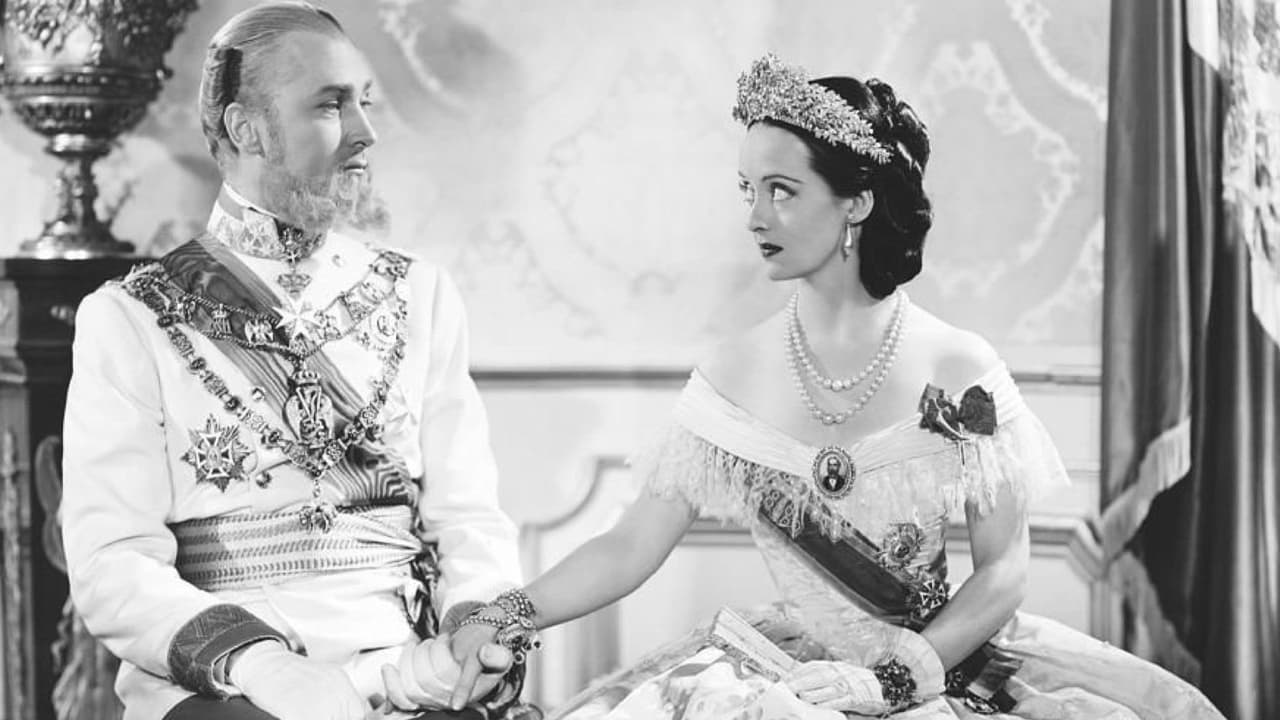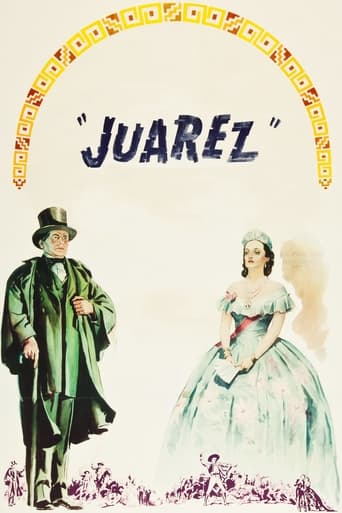

Wonderfully offbeat film!
... View MoreFantastic!
... View MoreBetter Late Then Never
... View MoreThe film never slows down or bores, plunging from one harrowing sequence to the next.
... View MoreCopyright 10 June 1939 by Warner Brothers Pictures, Inc. New York opening at the Hollywood: 25 April 1939. U.S. release: 10 June 1939. U.K. release: November 1939. Australian release: 12 October 1939. 132 minutes. SYNOPSIS: It is 1863. The French army, in Mexico as an armed bill collector, is failing its purpose. The liberal constitutional government under the Zapotecan Indian, Benito Pablo Juarez, a brilliant, honest statesman and president, will not pay because it cannot. The treasury has been emptied, the country all but ruined by the dictators and militarists who, through the centuries have preceded him in office. NOTES: Negative cost: around $1.4 million. Brian Aherne was nominated for Best Supporting Actor, losing to Thomas Mitchell in Stagecoach. Number 8 on the Film Daily's annual survey of American film critics. COMMENT: Controversial in its day because of its many historical distortions (and indeed fabrications), Juarez is best viewed as a superlative piece of dramatic entertainment. Superbly set and photographed, with brilliant performances, masterly direction, and a Korngold score, what more could you ask? Yes, two more things - and Juarez has them: a riveting script, breathtakingly paced.OTHER VIEWS: A quite impressive film, the two parts of Juarez and Maximilian are well written and admirably acted by Paul Muni and Brian Aherne (Mr Muni's make-up is extraordinarily impressive: he is an Indian to the very shape of the skull and the stony Aztec profile). - Graham Greene.
... View MoreThe story of Archduke Maximilian, the Austrian nobleman who was induced by Napoleon III to assume the role of monarch of Mexico in 1863, displacing Benito Juárez, Mexico's liberal president, played by Paul Muni. His enthronement was endorsed by the wealthy land-holding aristocrats of Mexico -- eighty-five families. The US was too busy fighting its own Civil War to bother with violations of the Monroe Doctrine. Juárez and his armies put up a stiff fight, and eventually Napoleon withdrew his French forces from Mexico. Maximilian and two of his loyal Mexican were captured and executed. Maximilian's wife, "the mad Carlota", was hospitalized in Europe and finally sent to a sanitarium.The film sticks pretty closely to historical fact, as far as a non-historian can tell. It's gripping. The hero is not Juárez at all but Maximilian. And, as presented here, it's an unalloyed epic tragedy. Shakespeare could have done wonders with it. Brian Aherne is Maximilian -- "Max", as his wife, Bette Davis calls him -- is a dignified man full of good intentions, whose policies (with one notable exception) followed those of Benito Juárez. Both were determined to promote equality and justice in Mexico. Again and again, Max defies the eight-five tycoons in favor of the ordinary people, most of whom can't read or write.The way Aherne plays Max, he's so gentle and dignified that he's almost effeminate, an impression supported by his hair style, which appears to be braided and coiled atop his head, and by this spectacularly unwholesome looking set of muttonchop whiskers. He believes that the Mexican people have invited him to become their emperor by means of a referendum, not realizing until too late that the referendum was rigged. He's a man of principle tempered by good sense. The ongoing war is nettlesome to him and he sends a messenger to Juárez with an offer to become Prime Minister of Mexico. All that separates them, as Juárez observes, is the word "democracy." Muni plays the character as a pompous humanitarian, full of folksy liberal pieties. Hs movements are slow and deliberate. He overacts underacting. Unlike Max, he's never in doubt about anything, which makes him rather dull. And, in a mistaken attempt to have him resemble the historical Max, make up has turned Muni into a clayish lump. And Muni delivers lines that seem made of lead. "In a monarchy, the government changes the people. In a democracy, the people change the government." Clunk.Actually, Juárez does seem like a law-abiding populist but he's about as yielding as reenforced concrete. He spurns Max's offer of Prime Minister, preferring war to compromise. Max, on the other hand gives a reasonably good argument in favor of kingship. A king, belonging to no party, owes no one anything and therefore can be impartial, while a president is beholden to the particular forces that elected him.I called the argument "reasonably good" because Mexico in the 1860s, with most of its population illiterate farmers, may not have been entirely ready for a republic. What followed Juárez was a series of dictators, factional disputes and revolutions, including a raid across the border into the USA by Pancho Villa in 1917. Interesting parallel: When Max's French troops try to fight Juárez's army, that army dissolves into the general population in its own neighborhood. If you can't find them, you can't fight them. Ditto after Villa's raid into Columbus, New Mexico. The US Army sent a large expeditionary force into Mexico to find and punish Pancho Villa and his army. But there was nothing to fight. The soldiers had turned into farmers.This was released in 1939 and lest we miss the point of dictatorship vs. democracy, the appearance of Archduke Maximilian is accompanied by the strains of "Deutschland Über Alles." Some other notes: Back in the USA, the South wanted to invade Mexico and turn it into a slave-holding nation, while slavery had been outlawed two generations earlier. And some of Lincoln's advisers wanted him to declare war on Mexico to deflect attention from the Confederate victories during the early years of the Civil War. (Mexico as low-hanging fruit.) In the end, the populist movement prevailed in Mexico; the vast haciendas were broken up and the land redistributed to farming families, each of which got enough land to support itself. The irony was that the birth rate became so high that the family farm could no longer feed so many people, so many of the farmers migrated to the cities in search of work, found little, and established the squatter settlements in shacks of corrugated tin and cardboard that now surround Mexico City. That's kind of off topic, an obiter dictum. Let's just say that in this movie, Juárez comes out on top but it's a tragic victory.
... View MoreAlthough there are some mistakes historically speaking,this is an absorbing screenplay,with superlative performances by Paul Muni,Bette Davis and Brian Aherne,who should have been at the top of the bill too,for he has more scenes than his two co-stars.Muni is almost frightening with his impassive face and his slow delivery.If looks could kill,his certainly would...Davis ,although she does not look like Charlotte physically ,gives a captivating portrayal of the empress.The scene when she prays Virgin Mary is impressive ,but not true: she was not sterile,but she and the emperor used to sleep apart!Their relationship was much more complex than the one depicted by Dieterlé: actually,the emperor was often away,it seemed that their strange love worked from a distance.Little by little,Maximilian lost all interest in power and Charlotte was ruling while he was gone (which often happened)or was staying in his Cuernavaca "paradise" .Aherne is Maximilian in the flesh.It's interesting to notice that his brother Francis-Joseph had deprived him of all his rights and his titles in Austria.Historians generally agree that he would not have accepted the Mexican throne,if Charlotte had not been his wife. the problem is that the film doesn't show us the couple BEFORE they get to Mexico:one thing to bear in mind is that Max did not accept the throne overnight;and many people in Europa (notably Queen Victoria and Empress Elizabeth aka "Sissi" ) had warned them it was more a curse than a blessing.Charlotte (Carlotta) ,someone reportedly said ,wanted to reign over any people anywhere.Sissi called her Max's black angel. Maximilian is depicted as a chivalrous noble sovereign which he was in a way.But of course ,he had lots of (Mexican)lovers since he didn't sleep with his wife Dieterlé does not pass over in silence the obnoxious role played by Napoleon the Third (and wife Eugénie de Montijo).Charlotte does show her contempt:"He is an impostor,his family is not an old one like ours ".The famous scene of the orangeade is included .Today,no serious historian would put forward that the drink was poisoned.But it might be possible that she was poisoned before leaving Mexico.Davis shines when she plays these scenes of madness.The scenes in Paris are not thoroughly accurate though:Eugenie (an incredibly beautiful Sondergaard) met first Carlotta alone in the Grand Hotel -they did not invite her to the Tuileries,which meant a lot about what they felt-Metternich was not the person who helped Carlotta :she first took refuge in the Vatican where the pope had trouble to get rid of her,then her sister-in-law Marie -Henriette ,queen of Belgium,came to her rescue when she was treated almost like a prisoner in Miramar.All that concerns Maximilian's death is accurate ,his last words were "poor Charlotte!"Poor Charlotte indeed.She was to outlive almost everyone,even Empress Eugenie! She died in 1927,after years and years of insanity with occasional moments of lucidity ,notably during WW1.Dieterlé's movie is by no means uninteresting,but it would be exciting to film a remake in the light of the recent works about the Mexican adventure.
... View MoreThe rating is for historical costuming, as the costuming and hairstyle details are excellent. The odd looking period hair styles that are seen in 1860's tintypes are faithfully rendered and lend a very authentic feel. If you are a stickler for such things, you will get a kick out of this one. Noteworthy is the look of Paul Muni's character, (the chameleon like Muni is alway fun to watch) with a dour looking do, as well as the split beard hair comb of the Hapsburg character, with a center comb part that runs right down the back of his head to the neck. Strange to the modern eye, but typical to the period, it takes guts to trot out your talent with such coiffures. Also, I have the hots for Gale Sondergaard, who plays the sultry Empress.
... View More